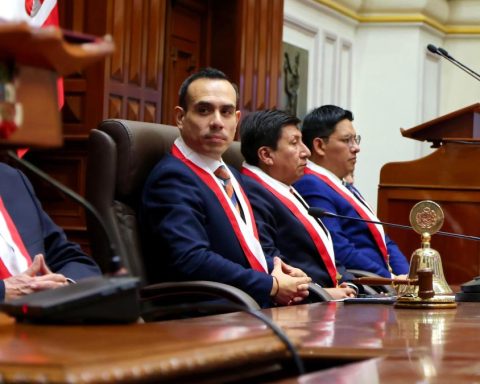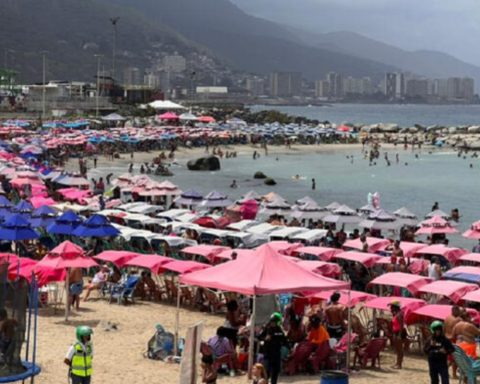The Panama Maritime Authority (AMP) was authorized by the Cabinet Council to sign addenda to contracts for the construction, development, and operation of a container terminal that was signed in 2013 and that should have been ready and operational last year. failing to comply with this investment, which also prevented the development of a container yard whose investor is currently the shipping company MSC, one of the largest companies in the world.
The council of ministers authorized the AMP to sign addendum 1 to the contract for the development, construction and operation, administration and direction of a container or general cargo terminal in Isla Margarita, Cristóbal, province of Colón, signed between the State and the company Panama Canal Colon Port INC approved by law 43 of June 18, 2013.
The Comptroller of the Republic, Gerardo Solís explained that this addendum to the contract is the result of a recommendation of this entity to the AMP, due to the breach of all contractual clauses by this port of Chinese investment.
Solís explained to the ministers, that after carrying out audits in the ports that operate in Panama and finding that it could not make the investment and be ready in June 2021 and in operation, employing more than a thousand colonenses, this action was recommended.
Faced with this situation, Noriel Araúz, administrator of the AMP, explained that what is intended is to modify, through an addendum, clauses of the 2013 contract such as the increase in the amount of investment, the extension for 20 years, from the endorsement of the addendum, modification of the Investment Bond, among other aspects.
The council of ministers also authorized the AMP to sign addendum 1 of the contract for the construction and administration of a container yard and logistics park called Isla Margarita Logistic Park in Isla Margarita, Colón signed between the State and the United Crown Construction company. Inc approved by Law 42 of June 18, 2013.
This logistics park could not be built at the time, since the container terminal did not exist, explained Araúz.
The objective of this project is to meet the demand for storage required by the adjacent ports and adequate planning of the transport of merchandise from the port of embarkation or disembarkation until it reaches its destination, according to the AMP.
Araúz indicated that MSC, one of the largest shipping companies for cargo ships, is involved in developing this project.
MSC facilitates international trade between the world’s leading economies and between emerging markets on all continents. They include ground transportation, logistics and a growing portfolio of investments in port terminals.
On the other hand, the Cabinet Council also authorized the Minister of Commerce and Industries (Mici) Federico Alfaro Boyd, to present to the National Assembly bills such as 25-22, which approves the Protocol of the Agreement establishing a Association between Central America and the European Union to take into account the accession of the Republic of Croatia to the European Union and the draft Law 26-22 that approves the protocol of accession of the Republic of Guatemala to the Free Trade Agreement between the EFTA States and the Central American States signed in Schaan, Liechtenstein on June 22, 2015.
He indicated that the Association Agreement between Central America and the European Union (hereinafter AA), was signed on June 29, 2012, ratified by the National Assembly through Law No. 27 of April 17, 2013, and published in Official Gazette 27269 on April 18, 2013, entering into force for the Republic of Panama on August 1, 2013.
Alfaro stressed that the European Union is the main destination for agricultural exports, being an important consumer of tropical products, such as bananas, and seafood, guaranteeing the continued export of our products to that region, now with the inclusion of Croatia.
Regarding the second proposal on the Protocol of Adhesion of the Republic of Guatemala to the Free Trade Agreement between the States of the European Free Trade Association and the Central American States (Costa Rica and Panama), he indicated that the FTA between the States of the European Free Trade Association (EFTA) and the Central American States (Costa Rica and Panama) was signed on June 24, 2013 and approved by the National Assembly through Law 4 of April 7, 2014.
Guatemala and Honduras began the negotiation, but did not complete it and withdrew.
“In October 2014, two months after Panama put it into force, Guatemala concluded the negotiation with the EFTA States and in June 2015 the States Parties to the Agreement accepted Guatemala’s accession,” said Alfaro.
He explained that the incorporation of Guatemala to the Treaty will allow us to have access to another market for re-exports of merchandise originating in the States of the European Free Trade Association, through our logistics platform and the figure of the re-export certificate.
Guatemala is currently the second destination for re-exports from the Colon Free Zone in Central America.
RELEASE PRESIDENCY











